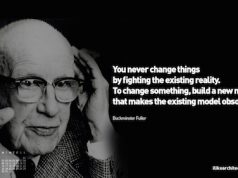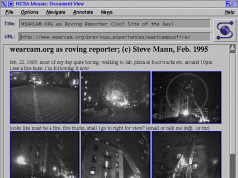Detroit as a perfect machine for making surface parking spaces in urban cores. Ref Streetsblog.org
A new report from the US-based Brookings Institute describes five key success factors for smart cities—in our opinion an increasingly anachronistic and meaningless term for tomorrow’s cities. While the authors’ intent is well justified, they miss the aspirational potential of responsive, wired cities through their focus on the administrative functions of city management. That’s not to say Brooking’s efforts are meritless, far from it. The report’s audience is city administrators and policy wonks, a group who will make city buying decisions once smart solutions are commercialized. What is missing, however, is a big idea urban populations can get behind. After all, what vision inspires you more: metaphorically living in a controlling, efficient machine, or living in an inspirational, changing symphony?
Before we pursue that question, here is a quick overview of Brookings’ five points as retold via their wired.com article mistitled, “Here is the Right Way to Build the Futuristic Cities of Our Dreams”:
1. Smart Cities Must Craft an Economic Vision That Includes a Specific Role for Technology
It all starts with cities making a concerted effort to understand who they are and where they want to go. In this respect it makes sense to think of cities like a business . . .
2. Smart Cities Must Use Technology to Promote a Healthy Economy
Once a city establishes an economic vision, it’s critical that technology address the three drivers of any healthy economy . . .
3. Smart Cities Must Include an Empowered Municipal Technology Executive
A well-designed economic vision will only succeed if it can be implemented. In many cases this will require city governments to realign their internal structures around new or redefined leadership.
That means recognizing the importance of smart city executives–whether known as a chief technology, innovation, information, or sustainability officer–and requiring collaboration between their office and others on major decisions, especially regarding physical development . . .
4. Smart Cities Must Balance Project Size and Appetite for Risk
Smart city marketing tends to focus on citywide investments that will dramatically change how every industry operates and every person lives. And while those kinds of megaprojects are exciting to think about, that kind of scale may be too big for most cities and may overstep the risks city leadership is willing to take . . .
5. Smart City Executives Need Stronger Networks and Improved Communication Tools
Considering how fast the technology sector moves, cities need methods to keep up with the pace–both for their own decision-making and in communicating with their citizens. Networking between city leaders is an invaluable way to share information about what worked (and what didn’t) in other markets . . .
The report’s authors reflect that most references to smart cities promote gee-whiz technologies that promise to make cities better, stronger, faster. Here we agree. Pushing technological fixes without corresponding attention to administrative realities let alone socio-political ones is like buying a one trick pony—people will be amused in the short term but will soon tire of feeding it apples when their hopes for a thoroughbred performance go unfulfilled.
In spite of this, where the authors go badly off course is in their city equals business analogy. Sorry gentlemen. Cities are not businesses. This misunderstanding has grown in popularity since the Reaganomics rightwing revolution of the 1980’s. From it we got the false notion that cost savings can be had by the public adoption of private sector “efficiencies.” The sobering truth is that while you might be able to ship manufacturing offshore to China for a cheap worker-driven, better price, try sending Toronto or New York there. Yet some governments try a political variation of this misguided outsourcing approach. Today’s Detroit is representative of what can happen when you devalue city functions to visionless means and ends bookkeeping. What a tragic end to a once great manufacturing city.
That’s not to say that cities can’t benefit from the adoption of administrative best practices. But the criticism we have with Brookings’ framing is their choice of how to reach that end. Where is the vision? What will move people to reinvent the way they live? “I want to live in a better business,” just doesn’t have the same appeal as, “Ask not what your country can do for you . . .”
If you’re old enough to remember, there was a time in North America when investing in one’s city showed our global coming of age. We lived to invest in the best infrastructure money could buy to build homes for the best schools to be attended by the brightest students—our children. Our public symbols were first rate. Think of the new Toronto City Hall as just one example. We invested in the best people to plan and manage our cities. They weren’t MBAs (and I write this as a holder of an Ivey MBA). They were engineers, planners, architects, politicians, administrators, and policy makers. We paid taxes proportionate to the grand dream of attaining the kind of world we wanted to raise our families in.
It was generally acknowledged by that generation, or at least innately understood, that a city is the product of thousands of years of social evolution. Cities can be described as a constructed legacy, a physical corpus made by generations of city creators from all races and creeds. Post war North America wanted to show Europe that it could have cities every bit as powerful, livable, or dynamic as anything the continent offered. Sometimes we got it right. Betting the farm on cities as so many live hosts for the vampirish automobile, however, took us sideways. Still, we were proud of our civic accomplishments. Even invasive highways were cool because they provided the ultimate social freedom to a culture of social nomads. Meet me on Highway 61 anyone? American cities had their problems, but they were built on a big idea almost everyone bought into.
Then came the value engineering, city as business plan leaders (sorry to value engineers as professionals, but a great city needs civic touch points that cannot be supplied by the lowest bidder). Look to Rob Ford as your spiritual leader you tax-cutting penny pinchers. You got what you paid for. In tough financial times some people will buy into the low/no tax mantra. It is difficult to blame them. The hard-to-understand truth is the most expensive city in real terms is the one starved of the taxes needed to fund its continued reinvention. When transit systems grind to a halt, more kids go without decent educations, crime rates go up, and energy costs rise, well, just what have you saved anyway? If they can, your kids will move away. If they can’t they’ll join the impoverished underclass because there are no jobs. Why would a business choose to build its headquarters in a dying city where people only think of their own good rather than caring about how their neighbours are doing?
Implicit in the Brookings’ paper is a belief that if only cities were smarter businesses they’d be better. Technocratic thinking having brought so many benefits to our cities is threatening to swamp the socio-civic underpinnings they depend on to remain livable. I’m being rhetorical here because wherever there are people there is social exchange, but is it society? And if a city is a business which type is it? Enron? Apple? Blackwater? Google? Businesses the economic size of cities are complex entities with one primary goal. They maximize shareholder value. Citizens are not shareholders. In fact, one sign of a healthy city is where the smallest, least powerful “investors,” if I can borrow the analogy to make a point, are treated almost as well as the most powerful. Businesses are, on the other hand, not democracies. Employees don’t get votes, especially at the lower echelons. They’ll also downsize at the slightest faltering in their quarterly earnings. Try doing that with a city.
Let’s agree then to put the comparison to rest: cities are not businesses—smart cities even less so. Canadian scholar Northrop Frye wrote in, “City at the End of Things,” that the future of progress as related to cities would not end well. Adopting ideas like cities are analogs to technocratic businesses hastens us towards a dystopia that even a Brookings might find difficult to rationalize. If cities aren’t business, what are they? If you’re a French, mid 20th C. philosopher they might be psychogeographies. We like the symphony metaphor. A lot of people coming together to play an agreed upon score feels more human. Doesn’t it?
If you want to better understand the MESH Cities approach to intelligent, responsive city building take a look at our site. It is a work in progress, and we invite you to participate.
Discussions like this one are on the agenda at next week’s Global Cities Summit here in Toronto. Join the debate if you can. We look forward to meeting you there.







